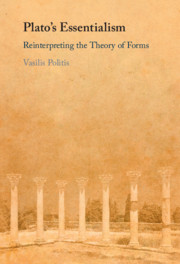Book contents
- Plato’s Essentialism
- Plato’s Essentialism
- Copyright page
- Dedication
- Contents
- Acknowledgements
- Introduction
- Chapter 1 Why cannot the ti esti question be answered by example and exemplar?
- Chapter 2 Why cannot essences, or Forms, be perceived by the senses?
- Chapter 3 Why are essences, or Forms, unitary, uniform and non-composite? Why are they changeless? Eternal? Are they logically independent of each other?
- Chapter 4 The relation between knowledge and enquiry in the Phaedo
- Chapter 5 Why are essences, or Forms, distinct from sense-perceptible things?
- Chapter 6 Why are essences, or Forms, the basis of all causation and explanation?
- Chapter 7 What is the role of essences, or Forms, in judgements about sense-perceptible and physical things?
- Chapter 8 Why does thinking of things require essences, or Forms?
- Chapter 9 Why are essences, or Forms, separate from physical things?
- Chapter 10 What yokes together mind and world?
- Conclusion
- Bibliography
- General Index
- Index Locorum
Chapter 10 - What yokes together mind and world?
Phaedo 99–100 and Republic VI. 505–509
Published online by Cambridge University Press: 25 June 2021
- Plato’s Essentialism
- Plato’s Essentialism
- Copyright page
- Dedication
- Contents
- Acknowledgements
- Introduction
- Chapter 1 Why cannot the ti esti question be answered by example and exemplar?
- Chapter 2 Why cannot essences, or Forms, be perceived by the senses?
- Chapter 3 Why are essences, or Forms, unitary, uniform and non-composite? Why are they changeless? Eternal? Are they logically independent of each other?
- Chapter 4 The relation between knowledge and enquiry in the Phaedo
- Chapter 5 Why are essences, or Forms, distinct from sense-perceptible things?
- Chapter 6 Why are essences, or Forms, the basis of all causation and explanation?
- Chapter 7 What is the role of essences, or Forms, in judgements about sense-perceptible and physical things?
- Chapter 8 Why does thinking of things require essences, or Forms?
- Chapter 9 Why are essences, or Forms, separate from physical things?
- Chapter 10 What yokes together mind and world?
- Conclusion
- Bibliography
- General Index
- Index Locorum
Summary
The chapter is dedicated to the Sun Analogy in Republic. It shows that, for Plato, mind and world are co-ordinate: neither is prior to the other; and this is because both mind and world are co-explained by a single ultimate principle, which is super-ordinate to both mind and world: the Idea of the Good.
Keywords
- Type
- Chapter
- Information
- Plato's EssentialismReinterpreting the Theory of Forms, pp. 224 - 229Publisher: Cambridge University PressPrint publication year: 2021

